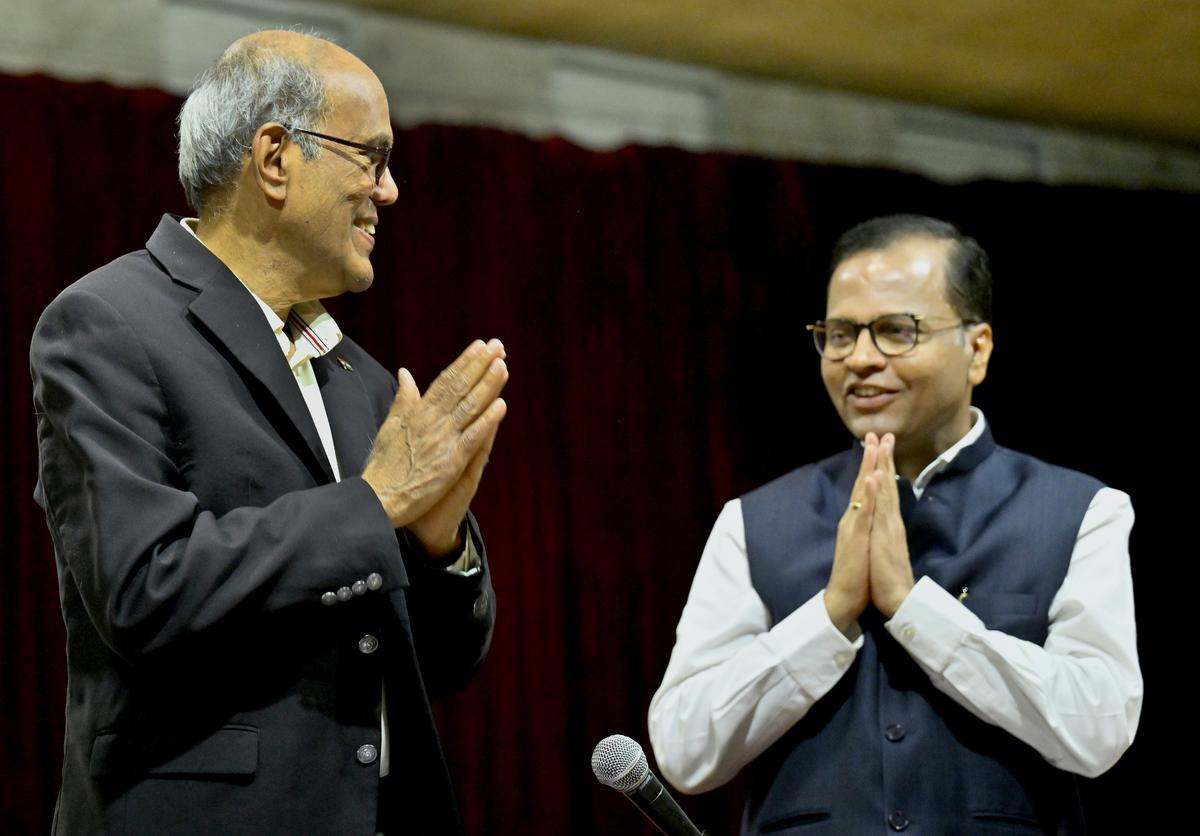Former RBI Governor Calls for Greater Center-State Cooperation in Fiscal Federalism


Former RBI Governor Duvvuri Subbarao Delivering The Third BPR Vithal Memorial Lecture on ‘India’s Fiscal Federalism – Quo Vadis? ” At BPR Vithal Auditorium in the Center for Economic and Social Studies in Hyderabad on Thursday. , Photo Credit: Nagara Gopal

Special Chief Secretary (Finance) Government of Telangana, K. Ramakrishna Rao Welcoming Former Governor of Reserve Bank of India Duvvuri Subbarao in Hyderabad on Thursday. , Photo Credit: Nagara Gopal
Former Reserve Bank of India (RBI) Governor Duvvuri Subbarao Underscored The Need for a Cooperative Approach to India’s Focal Federalism in His BPR VITHAL Memorial At the Texture at the Tect Dies (Cess) in Hyderabad on Thursday.
Speaking on ‘India’s fiscal federalism – Quo Vadis?’ Subbarao traced the evolution of center-state financial relations and highlighted the need for a more consultative and transparent framework to address current frictions.
Subbarao Classified India’s Fiscal Federalism Into Three Phases. The first, ‘DOCILE Federalism’ (1947-early 1970s), Saw the Center Dominating Political and Economic Decision-Making, with a Single-Parthy Rule and Tentralized Resource Allocation. The second phase, ‘cooperative federalism’ Le 356. The Third Phase, ‘Combative Federalism ‘(Mid-1990s-present), has been marked by increasing content between the centers and states, particularly in economic matters, with regional parties playing a significant Role in Nuralnanance, HE SAID
Are the terms of fiscal federalism unfair to states?
A Common Narrative Among States is that India’s Fiscal Arrangements Favor The Center. States Argue That they Bear Larger Expenditor Responsibility However, Subbarao Contested This Claim, Pointing Out that States Today Enjoy Greater Spending Power than their counterparts in many federal nations.
He said, “Indian States Account for Nearly 60%of Total Government Expenditure, Higher Than in Countries Like Brazil (40.2%) and Indonesia (37.9%). Additionally, tax devolution has expanded, particular after a 2000 constitutional amendment that entitled states to a share in the center’s total tax pool. “
Challenges in Center-State Relations
Despite these shifts, Subbarao ACKNOWLEDGED AREAS WHERES WHERE ANEAS Actions Create Friction. One such is the growing use of cesses and surcharges, which do not form part of the divisible tax pool and thus Reduce States’ Overall Share. “According to RBI Data, the share of divisible taxes in the center’s revenue has fallen from 88.6% in 2011-12 to 78.8% in 2021-22 due to Due to Increasing Reliance on Casess and Surcharages. States also express Concerns Over Centrally Sponsored Schemes (CSS), Arguing that they impose Rigid conditions on Spending. Subbarao Defended Css as Necessary for National Priorities but recommended green consultation in their design, ”He said.
Another point of constitution is borrowing limits imposed on states under article 293 of the constitution. While kerala has challenged this restriction in the Supreme Court, Subbarao Argued that Fiscal Discipline is Necessary to Maintenal CreditWortworthness. He NOTED That Indian States have more Borrowing flexibility than subnational entities in many other countries, where borrowing is often restricted to capital projects.
Freebies debate
Subbarao also touched upon the issue of freebies, warning against competitive populism in fiscal policy. While Acknowledging The Need for Targeted Welfare, He Cautioned that Indiscriminate Handouts Cold Undermine long-term Economic Growth. He called for a National Consensus on Restraining Fiscal Populism, Urging The Center to take the lead in frameing responsible policies.
With the abolition of the planning commission, subbarao noted the absence of a robust platform for center-state consultation. The niti aayog, he said, is yet to fill this void effectively. He suggested structured, ageda-driven discusations to replace the current format of Chief Minister ‘meetings’ meetings, which often turn into political battlegrounds rather than CONSTRUCY THARUCY THARUCY THEARTARGRONDS RATO Political Battlegrands.
Towards Viksit Bharat
Concluding his lecture, Subbarao Underscored the Need for Center-State Cooperation in Achieving Viksit BHARAT BY 2047. While first generation economic reforms of the 1990s Econd Generation Reforms Focused on Land, Labor, and Taxation that require active State Participation. Without a Shared Economic Vision and Collaborative Policy-Making, He Warned, India’s Goal of BEAL OF BEAL of BEALOPED ADAVELOPED NANE BELDEN NATION NATION
Published – January 30, 2025 06:51 PM IST






I don’t think the title of your article matches the content lol. Just kidding, mainly because I had some doubts after reading the article.
Thank you for your sharing. I am worried that I lack creative ideas. It is your article that makes me full of hope. Thank you. But, I have a question, can you help me? https://accounts.binance.com/en/register?ref=JHQQKNKN